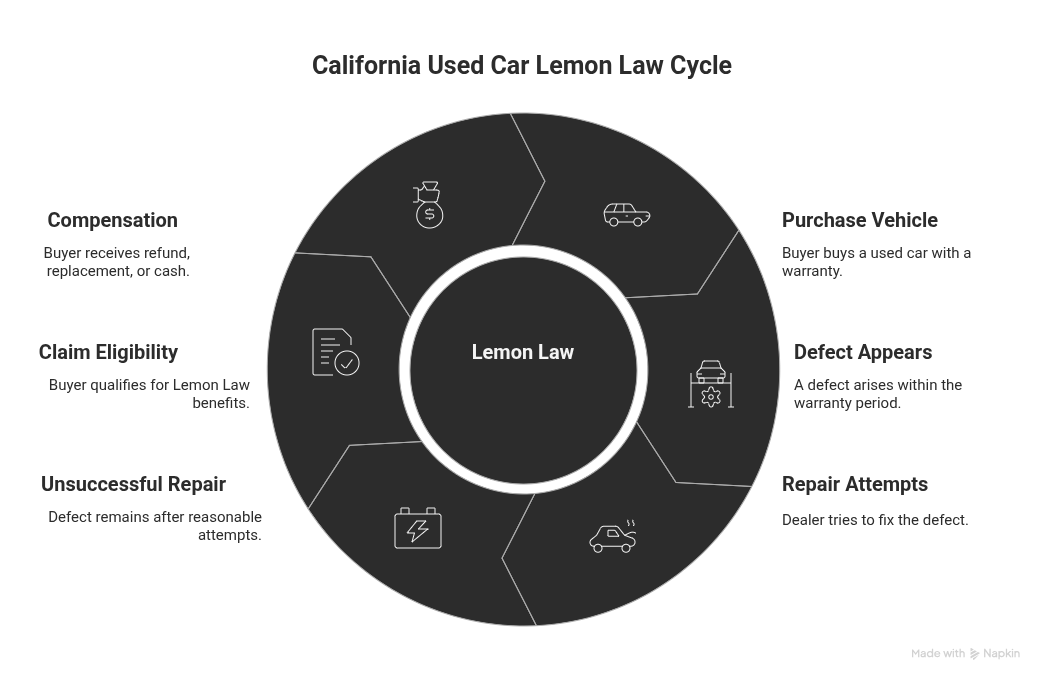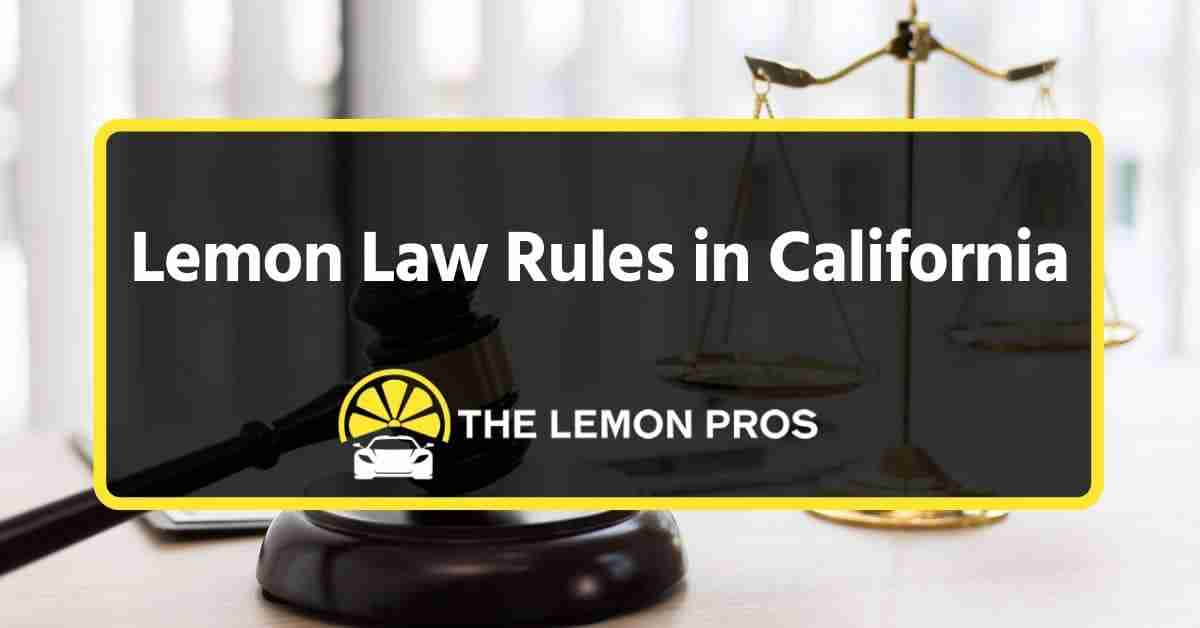
How Long Is the Lemon Law on Used Cars?
While the used car Lemon Law may differ in some aspects from the new car, consumers still have plenty of protections. It’s important to understand the differences in Lemon Law regulations if you want to get out of a defective vehicle. Thankfully, the used vehicle Lemon Law depends on the warranty provided with the purchase, allowing up to 90 days or 3,000 miles with a dealer warranty.
Contact The Lemon Pros to find out if you can receive compensation for your lemon vehicle. After helping thousands of Californian car owners get out from a lemon vehicle, we are prepared to represent your best interests against the manufacturer or dealer. Reach out for a free consultation to see what you may be owed.
How long is Lemon Law good for? This blog post covers the used car Lemon Law regulations, their specific duration, and how to get a replacement vehicle or monetary compensation.
Table Of Contents
- What Is the Lemon Law in California?
- How Does a Car Qualify for Lemon Law in California?
- How Long Does Lemon Law Last for Cars?
- What Is the Lemon Law for Used Cars in California?
- How Long Is the Lemon Law on Used Cars?
- State-by-State Variations
- How to Start a California Lemon Law Claim for a Used Car
- Potential Outcomes of a Successful Lemon Law Claim for Used Cars
- Tips for Buying a Used Car to Avoid Buying a Lemon
- Benefits of Hiring a Used Car Lemon Law Attorney
- Need a Lemon Law Attorney?
- FAQs
- How Does Lemon Law Work for Used Cars in California?
- Does the Lemon Law Apply to Used Cars After 30 Days?
- What Is the Time Limit to File a Lemon Law Claim for a Used Car?
- How Long Do I Have to Return a Used Car Under the Lemon Law?
- Is There a Mileage Limit for Lemon Law Coverage on Used Cars?
- Are All Used Motor Vehicles Covered Under Lemon Law?
What Is the Lemon Law in California?

In California, lemon law is known as the Song-Beverly Consumer Warranty Act. It applies to both new and used vehicles, although the regulations vary. For a used car, there’s only coverage if the vehicle was purchased at a dealer, and comes with either a written warranty or an extended service contract.
The used car regulations are different from those applicable to new vehicles. For new cars, the average lemon law settlement in California can be anywhere from $5,000 to $100,000. However, used cars aren’t usually worth as much as a new vehicle, naturally lowering the settlement. Compensation is based on the market value of the vehicle and how much you spent on it.
How Does a Car Qualify for Lemon Law in California?
For a car to qualify for lemon law, it must be covered under a warranty. Additionally, it must have an unrepairable defect that appeared within the first 18,000 miles or 18 months of ownership. The specific types of problems covered by lemon law in CA vary widely.
In some cases, it could be something as serious as a defective engine, but can also cover milder issues such as moldy-smelling air conditioning. The bottom line is that defects must substantially impair the vehicle’s use, safety, or value despite a reasonable number of repair attempts. Here are a few examples to consider:
Mechanical failures: Troubles with the transmission shifting, burning too much oil, misfiring engine, etc.
Electrical system malfunctions: Glitchy navigation system, random power surges, malfunctioning electric seats, etc.
Safety concerns: Airbag failure, safety-related recalls that remain unresolved, seat belt troubles, etc.
How Long Does Lemon Law Last for Cars?
With a new car, the lemon law applies for the first 18,000 miles or 18 months, whichever comes first. This time starts with the delivery of the vehicle.
However, the used car lemon laws relate directly to warranty coverage. How long does the lemon law last for used cars? If there’s no warranty protection on the used vehicle, lemon law doesn’t apply. If there’s a warranty, drivers may receive up to 90 days or 3,000 miles of coverage for lemon law.

What Is the Lemon Law for Used Cars in California?

Lemon law ensures that drivers aren’t left with a defective vehicle while it has a warranty. Lemon law applies to used cars only if there’s a warranty on the car. For that reason, you can’t expect lemon law protection if you purchase a car from a private seller.
With a manufacturer’s warranty, such as with a Certified Pre-Owned vehicle, the car would receive the full 90 days or 3,000 miles of protection. However, during the warranty period, there would have needed to be a reasonable number of attempts to repair the problem.
All of these regulations can be confusing. Navigating the motor vehicle lemon law can be complicated. Determining if a problem is covered or determining what types of motor vehicles are covered can be challenging unless you have a background in law. Otherwise, it’s best to have a qualified lemon law attorney on your side, guiding you through the process.
How Long Is the Lemon Law on Used Cars?
Because many factors are involved with used cars, each one falls under different timeline regulations. For starters, there are varying laws from state to state, which we will dive into deeper in a minute. There’s also the issue of the vehicle’s age and mileage. Most dealers aren’t going to provide a warranty with an older car, so there aren’t the same protections available.
The vehicle must also be sent to a qualified repair shop a reasonable amount of times for the same defect. The number of times varies depending on the complaint. For example, with a serious safety hazard to worry about, the law often only requires two visits. On the other hand, a defective vehicle that struggles to air condition the cabin, or has another problem that doesn’t affect the safety, may require up to four repair attempts before action can be taken.
Beyond these regulations, consumer actions and legal processes are similar to those of the new car laws. Ultimately, how long a lemon law process takes depends on how the manufacturer or dealer responds to your letter and if litigation is necessary. If the problem can be resolved through arbitration, you may have a resolution within weeks.
State-by-State Variations

California lemon laws are among the most inclusive in the nation. California drivers are well protected by protection for both new and used vehicles. There are even inclusions for other vehicles, such as all-terrain vehicles, motor homes, and motorcycles.
Texas lemon law also offers used car protection, along with Connecticut, Massachusetts, Pennsylvania, New York, and New Jersey. Texas also has the Deceptive Trade Practices Act (DTPA), which prevents deceptive business practices, including during the sale of used cars. On the other hand, Alabama, Mississippi, North Dakota, South Dakota and Nebraska are among the states that don’t include used cars at all.
How to Start a California Lemon Law Claim for a Used Car
The first step is to gather all of your documentation to support your case. You want the paperwork from the sale that indicates the full purchase price and any fees charged. You may be due the sales tax, registration fees and other initial expenses.
You also need the manufacturer’s original warranty or extended warranty paperwork. Pull together all of the repair orders, complete with the names of the technicians you spoke with and the resolution. If your car was in for a safety recall or technical service bulletin, this information should be marked on the repair order.
Once you have the paperwork together, it’s time to provide written notice to the manufacturer or dealer by certified mail. You may ask for a refund or replacement of the car because the defect has been shown to substantially impair its use, value, or safety. By asking for a reasonable allowance to get out of the vehicle, you hope to avoid going to court for the claim.
It’s the dealer's or manufacturer’s duty to respond to your letter. In many cases, they will offer an arbitration program, especially when dealing with a safety concern. By taking this route, you have a quicker settlement. If you don't like the arbitrator's decision or it isn’t offered, litigation may be necessary.
Filing a lemon law complaint is best done with the help of a skilled attorney. Hire The Lemon Pros and let us navigate the claim for you, ensuring that no mistakes are made. We can alleviate stress and confusion because we know how to deal with the manufacturer.
Potential Outcomes of a Successful Lemon Law Claim for Used Cars

Resolution for a new, used, and leased car has several possible outcomes, depending on the situation. Because of the substantial defect, a replacement may be necessary. With the defect covered by the original warranty, the dealer or manufacturer may offer you a new vehicle comparable in value.
Otherwise, you may receive a refund if you file a claim within a reasonable period. A full refund includes the purchase price or down payment and any fees you incurred.
In some cases, the manufacturer or dealer may offer further repairs and an extended warranty to cover the mechanical or safety concerns. Let’s say you’ve already had the vehicle in for three repair attempts and it was in the shop for longer than thirty days, you may be willing to accept further repair attempts in exchange for a longer warranty term. With this option, the manufacturer or dealer must resolve the issue and make the necessary repairs.
If you are a person entitled to compensation, there’s one more possible solution. You may accept a cash payout and keep the vehicle. Some people prefer this option for minor problems. However, if you take the payout, you may not be able to file for further damages if the defect continues, so you need to follow the advice of your attorney.
Tips for Buying a Used Car to Avoid Buying a Lemon
When looking to purchase a used car, it’s important to take every precaution so you don’t get a lemon. The following conditions and tips give you maximum protection.
Pre-Purchase Inspection

While this isn’t a step needed with most new and leased cars, all pre-owned vehicles should be inspected by an independent mechanic before purchasing. You can expect some normal wear and tear on the vehicle, but there shouldn’t be any major mechanical defects. Take the vehicle to a reputable shop in the area and pay a small fee to ensure it's sound.
Vehicle History Report
New vehicles have no report to worry about, but a used car can have a checkered history. Pay for a CARFAX vehicle history report to see its service record, whether it has been involved in any accidents, and if there are recalls worth looking into. It’s best to choose vehicles that were used for normal household purposes, not a commercial fleet or rental car. You’ll also be able to see how many previous owners it had.
Test Drive
Taking the used car for a test drive can help bring any problems to the surface. We recommend taking the car on several different types of roads (city streets, highways, country roads, etc) so you can get a feel for how the vehicle responds. It’s also wise to try out all of the features during the test drive to ensure everything works as it should.
Extended or Manufacturer's Warranty (Service Contracts)
Without warranty coverage, there’s no lemon law protection on a used car in California. Therefore, you want to choose a dealership that offers a lengthy warranty or provides a reasonable opportunity to purchase coverage. It’s never a smart idea to purchase a car from a private party because there’s no legal recourse if something goes wrong.
Benefits of Hiring a Used Car Lemon Law Attorney

A qualified lemon law attorney understands the lemon law regulations, ensuring that your used car or other vehicle is covered before filing a claim. An experienced lawyer knows how to immediately notify the manufacturer or dealer about the defect and get quick results so you aren’t left waiting for a replacement. You can find a great attorney by reading online reviews, asking your friends and family for recommendations, or checking their reputation with the Better Business Bureau (BBB).
It’s also important that you choose an attorney who defers payment until you win the case. This way, you are sure the lawyer will work as hard as possible to reach a settlement. Considering the average cost for a lawyer can be expensive, you want an attorney who only gets paid if you do. Choose one that offers a free consultation, so you don’t have to pay anything out of pocket.
Need a Lemon Law Attorney?
With how easy it is to make a mistake when filing a lemon law claim, it’s essential to have a qualified attorney working for you. Used cars do have protections in California, especially if there's a defect that substantially impairs its use, value, or safety, but the laws can be confusing. If you’ve been the victim of a lemon car, we encourage you to leave a comment and share your experience with others.
Contact The Lemon Pros to get a replacement vehicle or a refund for your defective car in California. We work hard to protect our customers and won’t quit until you are satisfied. Call today for your free consultation.
Visit us at our Lemon Law Attorney Practice in Beverly Hills today to get the support you deserve.
FAQs
Wondering how long Lemon Law protections last on a used car in California? These FAQs break down the timelines and rules so you can know your rights, whether your vehicle is still under the original warranty or facing ongoing problems.
How Does Lemon Law Work for Used Cars in California?
In California, Lemon Law can apply to used cars that are still under the original warranty. You remain responsible for certain costs, like maintenance, but the manufacturer may cover defects that impair the car’s safety or use. While you have some control over pursuing a claim, there are limitations depending on the vehicle’s age, mileage, and warranty status.
Does the Lemon Law Apply to Used Cars After 30 Days?
Yes, Lemon Law can still apply to used cars after 30 days, but only if certain conditions are met. The car must have been purchased from an authorized dealer, and the issues must be covered under the purchase agreement or remaining warranty. Claims are generally stronger when problems show up early and are documented.
What Is the Time Limit to File a Lemon Law Claim for a Used Car?
In California, the time limit to file a Lemon Law claim for a used car depends on the remaining warranty and when the defect first appeared. You must give the dealer a chance to fix the problem, and you need access to repair records as proof of repeated issues. Filing within these limits helps protect your rights.
How Long Do I Have to Return a Used Car Under the Lemon Law?
Under California Lemon Law, there isn’t a set “return period” for used cars, but you should act quickly once defects appear. Make your request as soon as possible after the date the problem is discovered, and seek legal assistance to ensure your claim is handled correctly.
Is There a Mileage Limit for Lemon Law Coverage on Used Cars?
Yes, California Lemon Law coverage for used cars often depends on the car’s mileage, not to exceed 18,000 miles or 18 months from the original new car delivery date. The issue must occur within an acceptable range under the original warranty, and you should present all repair records in the proper form.
Are All Used Motor Vehicles Covered Under Lemon Law?
Not all used motor vehicles are covered under California Lemon Law. Coverage depends on meeting specific eligibility requirements, such as being purchased from a licensed dealer and still being under the original warranty. If your claim is denied, you may have the right to appeal the decision.






